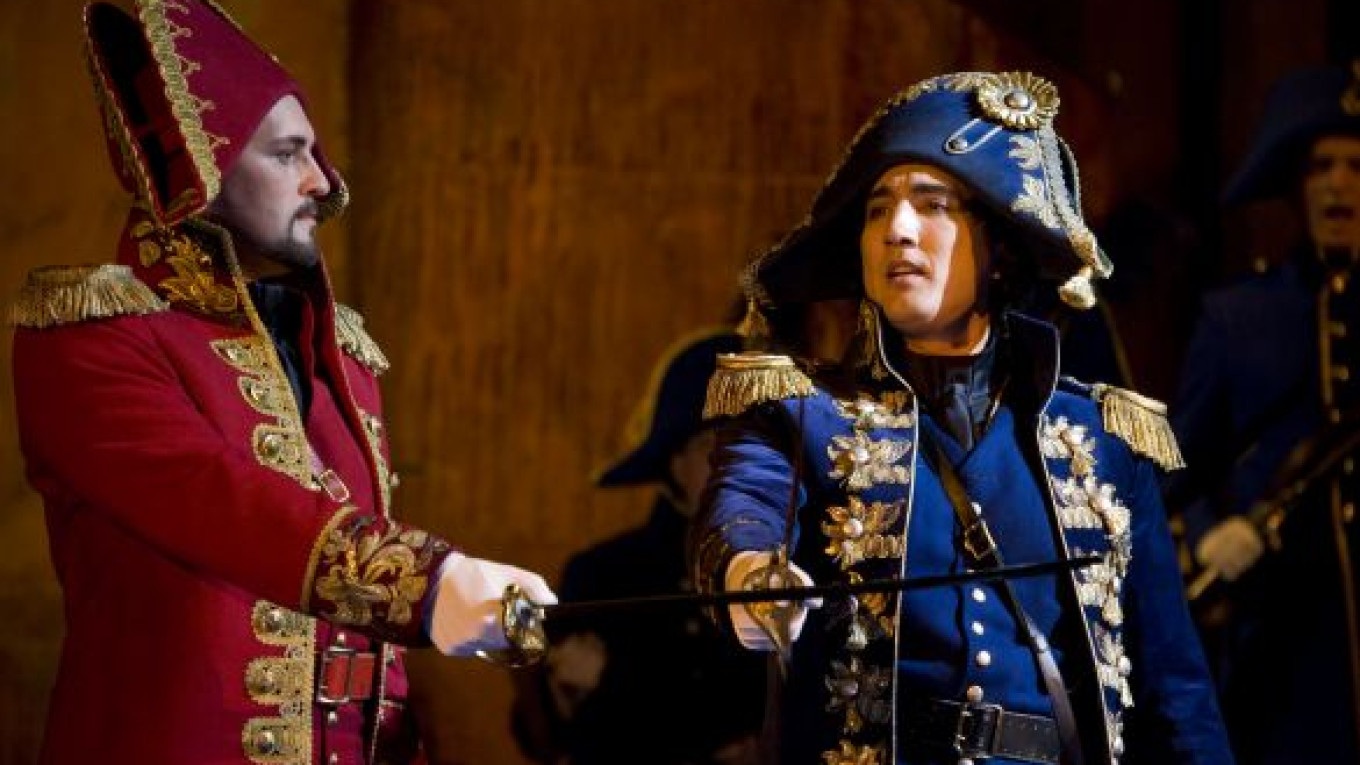The current opera season got off to an unusually bad start in the months leading up to the end of 2010. In addition to Helikon Opera’s unadventurous and indifferently performed pairing of Nikolai Rimsky-Korsakov’s opera “Mozart and Salieri” with Wolfgang Amadeus Mozart’s “Requiem” and the Bolshoi Theater’s thoroughly wrong-headed version of Mozart’s “Don Giovanni,” the Stanislavsky and Nemirovich-Danchenko Musical Theater brought to the stage Giuseppe Verdi’s “La forza del destino” and the Pokrovsky Chamber Musical Theater offered a reconstruction of its 1978 staging of Igor Stravinsky’s “The Rake’s Progress.” Unfortunately, the latter two productions also added nothing of real value to the Moscow operatic repertoire.
The lengthy and often rambling “La forza del destino” presents many challenges, both musical and dramatic. On the musical side, it requires five superb voices, well schooled in interpreting Verdi. Dramatically, it demands a director who can provide a reasonably coherent account of its tangled story.
Even the world’s leading opera houses have difficulty in assembling adequate voices for “Forza.” It came as a surprise, therefore, when the Stanislavsky and Nemirovich-Danchenko announced the opera as its first new production of this season. Surely, it seemed, the theater had no hope of coming up with a credible cast from its own roster of singers. And the Stanislavsky and Nemirovich-Danchenko rarely, if ever, invites guests from elsewhere to sing its operatic repertoire.
As it turned out, skepticism concerning the vocal result was mostly warranted, at least with the cast I heard at a performance following the premiere.
Coming closest to getting it right was mezzo-soprano Natalya Vladimirskaya, who sang the young gypsy Preziosilla with a full and flexible voice and played the role vivaciously. Veteran Yevgeny Polikanin, as Don Carlo, brother of the opera’s young heroine, Leonora, proved to be in surprisingly good voice, sounding at times like a true Verdi baritone. But what he produced failed in the end to add up to a truly satisfactory vocal portrayal. As usual, his idea of acting was simply to play another variation of his rather happy-go-lucky self, while his distinctly middle-aged manner and appearance made a mockery of the scene in which Carlo appears disguised as a student.
The lyric soprano of Natalya Petrozhitskaya has been heard to excellent effect at the theater over the past two seasons. As Leonora, she played the part superbly and sang with beauty and accuracy — but sadly with the wrong sort of voice. Leonora demands a so-called spinto soprano, one with a powerful lower register and an ability to “float” notes at the top of the scale. Petrozhitskaya, lacking both, was obviously miscast.
Conductor Felix Korobov led the orchestra in vigorous and idiomatic fashion, though in the case of a sometimes overly loud brass section, he might have heeded the words of the great English maestro Sir Thomas Beecham. “Never look at the brass,” Beecham advised conductors. “It only encourages them.”
Designer Sergei Barkhin cluttered the stage with an array of platforms and rather ugly tower-like metallic structures. Given the restrictions that the decor placed on movement, it was hardly surprising that the staging by Georgy Isaakyan looked as if it had been thrown together piecemeal.
I very much looked forward to a return to the Moscow stage of “The Rake’s Progress,” Stravinsky’s gem-like bow to 18th-century operatic traditions, with its sparkling libretto by the eminent English poet W.H. Auden and his long-time companion, Chester Kallman, that took inspiration from artist William Hogarth’s depiction of depravity in London of the 1730s.
The Pokrovsky Chamber Musical Theater’s production was first created in 1978 by the theater’s founder, Boris Pokrovsky, who died two years ago at age 97. Leading on opening night was its original conductor and now the dean of Russian maestros, Gennady Rozhdestvensky.
Unhappily, the revival proved a disappointment. What might have seemed exciting in 1978, when Stravinsky’s music was rarely heard in the Soviet Union and “The Rake’s Progress” was a complete novelty to audiences here, came across as lifeless on stage and sung in a manner that seldom met the score’s vocal requirements. There was much to commend, though, in the orchestra’s superb playing.
Too bad, as the Pokrovsky continues for the most part to greatly enliven the Moscow operatic scene, even in the absence of its distinguished founder. A festival there, featuring some of Boris Pokrovsky’s finest stagings, is due to begin on Thursday. It is well worth exploring.
“La forza del destino” (Sila sudby) next plays Feb. 12 and 24 at 7 p.m. at the Stanislavsky and Nemirovich-Danchenko Musical Theater, 17 Bolshaya Dmitrovka. Metro Chekhovskaya. Tel. 629-2835. www.stanmus.ru.
“The Rake’s Progress” (Pokhozhdenia povesy) next plays Tuesday and March 19 at 7 p.m. and March 20 at 6 p.m. at the Pokrovsky Chamber Musical Theater, 17 Ulitsa Nikolskaya. Metro Teatralnaya. Tel. 606-0108. www.opera-pokrovsky.ru.


